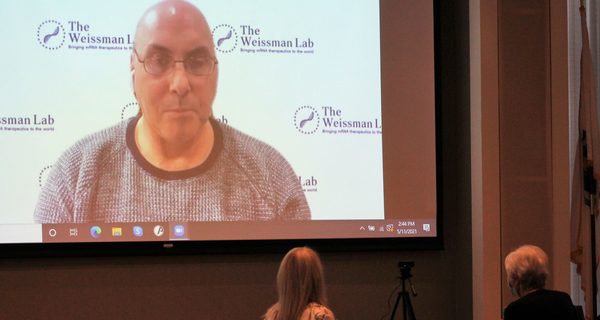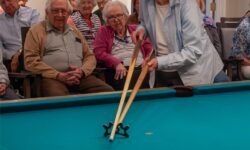Questions from Fox Hill Village seniors concerned COVID variants, potential sterility from the vaccine, and a potential HIV vaccine.
By James Kinneen
Hometown Weekly Reporter
Last Tuesday afternoon at the Fox Hill Village Auditorium, Drew Weissman’s father, Harold, sat at the front of the crowd with a shirt on that read: “My son is going to save the world. Ask him about it.” While it would be easy to dismiss the idea as parental-pride-spurred hyperbole, it really isn’t.
Drew Weissman kind of is saving the world, and Tuesday via Zoom, the seniors of Fox Hill Village got a chance to ask him about it.
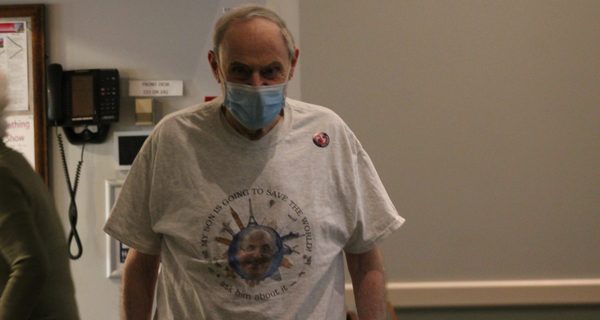
Drew Weissman is an immunologist who began working with Kati Kariko to figure out how to get people’s bodies to stop attacking synthetic RNA: a problem that was so vexing, Kariko struggled to get any kinds of grant money, which eventually led to her being demoted at the University of Pennsylvania. Eventually, the two resolved the issue and published their findings.
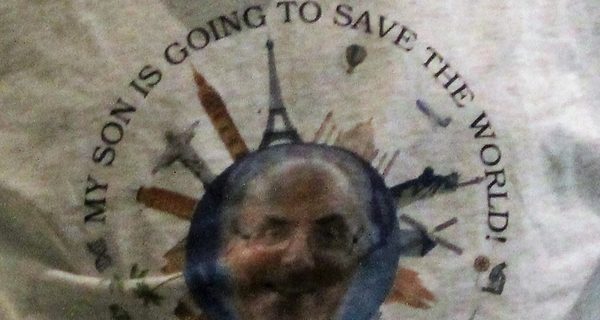
“What Kati’s interest was, is making an RNA that encoded a protein and having the cell make that protein. That’s easy to do and she accomplished that. She then tried to deliver that RNA to an animal, but the animal didn’t make the protein and got sick. And she kept trying and kept changing the protein. I’m an immunologist. So, when I got RNA from her, I quickly realized the reason the animals got sick was that the RNA was inflammatory. So, what I figured at that time, and what we discussed, was: if we could figure out the inflammation and get rid of it, it could be a great platform for delivering proteins, gene therapy, vaccines, lots of different things.”
When asked if he could put what the answer ended up being after all those years into laymen’s terms, Weissman explained: “Essentially we changed the structure of one of the letters in the RNA. That structure is recognized as foreign. We made it look not foreign.”
While that might sound simple, it was both hugely innovative and potentially earth-shattering. Derek Rossi, one of the founders of Moderna, even thinks they should win the Nobel Prize in chemistry for it.
While his research was published years ago, Weissman’s discoveries have been pivotal in the creation of the COVID-19 vaccines, in large part because as opposed to other vaccine creation techniques, with the RNA vaccines, you don’t need to grow the virus - which means they can be made much more quickly.
“The first thing is that we and others have shown that modified RNA in LNPs is incredibly potent. And these are mostly in animal models, but they make just an enormous, effective immune responses. The second thing is that it was an emergency, so you needed to come up with a vaccine quickly. And RNA allows that. You don’t have to have the virus. You don’t have to grow the virus. You only need the sequence of the protein of interest. And we had that on January 12, and then we cold start making the vaccine. For all the other types of vaccines, the adenovirals, the inactivated virus vaccines, they had to isolate the virus, grow it up, inactivate it, and that takes a lot more time. So the RNA works well, and it’s fast.”
But Weissman has even bigger aspirations for the technology. In fact, while he acknowledged the COVID-19 vaccines will always be a big achievement because they were first, he thinks in a decade, the technology could have created a vaccine for all coronaviruses and influenza viruses.
“I’m pretty sure we’ll have a pan-coronavirus vaccine, we’ll have a pan-influenza vaccine, we’ll have gene therapies for sickle cell anemia, we’ll probably have gene therapy for lots of other diseases. There’s huge potential for growth.”
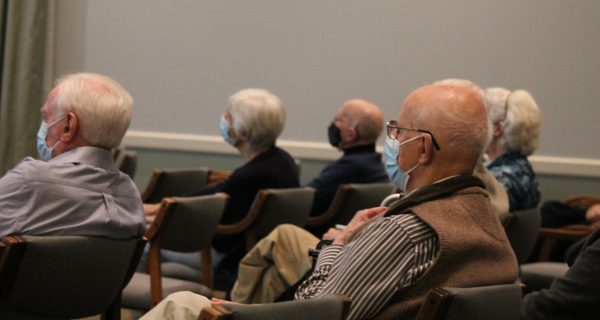
Although many articles have talked about the lack of belief from people who wouldn’t fund Weissman and Kariko's research, Weissman rejected having any big “I told you so” moment as “just not my personality.”
“I don’t think that way," he declared. "I’m just happy we stuck with it and that it works.”
While Drew Weissman may be very humble about his work, his parents are not shy about his successes.
“He’s the most brilliant person I’ve ever known, and he was since the minute you could understand what he said - and that was very young,” his mother, Adele, explained, noting that they didn’t push him into medicine. “You never could push Drew anywhere. He knew where he was going almost since the beginning.”
As for the new media coverage he is getting, Adele noted: “I think it’s long overdue. I’ve noticed many more people are involved with the praise, with the success of his research, but he’s been doing research on mRNA for twenty years. It just happened that he developed the vaccine around the time that it really burst in the population, and thank God he could do it.”
She even told the woman injecting her with the vaccine that her son was responsible for the technology behind it but, “the individual who injected us here, when I told her it was my son’s vaccine, she said, 'Yeah, sure, next!' We’re used to it. You don’t have to convince us of his brilliance or his delightful personality. He’s got two lovely children and a wife, and they all love each other and that’s all I care about.”
Drew Weissman’s technology has already saved hundreds of thousands of lives, and he thinks the COVID-19 vaccine is only the beginning. Years from now, the work he has done may result in the manufacturing of a vaccine for every strain of influenza, coronaviruses and therapies for issues like sickle cell anemia.
But while he may be responsible for the manufacturing of all sorts of lifesaving technology, there’s one thing he wants made clear: he was in no way responsible for the production of his father's tee shirt.
“My sister made that,” he said. “I didn’t have any input on that.”





